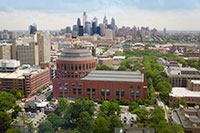What the FT Global MBA rankings tell us

Simply sign up to the Business education myFT Digest -- delivered directly to your inbox.
Top spot in the 2015 Financial Times Global MBA ranking of the 100 best full-time MBA programmes goes to Harvard Business School, which saw off challenges from London Business School (second) and the Wharton School of the University of Pennsylvania (third) to keep its crown. Stanford Graduate School of Business, second last year, slipped to joint fourth with Insead.
The ranking is based on surveys of the business schools and their graduates of 2011. MBA programmes are assessed according to the career progression of alumni, the school’s idea generation (see Key to the 2015 rankings) and the diversity of students and faculty.
It is the sixth time Harvard has topped the ranking and the third year in a row.
Its alumni have the highest average salary three years after graduation, at $179,910 (weighted), nearly doubling their pre-MBA pay. Harvard is among the top schools for career progression and its MBA was the most highly recommended by graduates of other schools. It also comes second for research and its doctoral programme.
Harvard alumni cite the impact of the school’s reputation. “Harvard Business School has opened a lot of doors and made people almost irrationally willing to hire me,” wrote one graduate. Graduates can also rely on a large and active network. “Alumni are incredibly generous with their time,” said another graduate. “Everyone will meet you for a coffee to share insights, advice and introductions.”
The University of San Diego School of Business Administration is the highest new entrant, at 66th. Nine other schools not in last year’s ranking feature in 2015, including Queen’s School of Business in Ontario, which last reached the top 100 in 2006.
China’s Fudan University School of Management and the UK’s Lancaster University Management School recorded the strongest progress, climbing 28 and 27 places respectively to 55th and 50th places.
MBA students’ main motivations are to increase their earnings, to learn about general management and to network. About 95 per cent achieved their aims three years after graduation.
Average alumni salary at that point is $133,000, an increase of 93 per cent on pre-MBA pay. Some 89 per cent of graduates accepted a job offer within three months of completing their MBA in 2011, drawing an average salary of $108,000.
——————————————-
The top MBAs

Top full-time MBA: Harvard Business School
For the third consecutive year, Harvard Business School is number one in the FT Global MBA rankings — the sixth time it has taken the top slot since the FT published its first ranking in 1999.
Though Harvard lags behind many European schools in the diversity of its student body and international mobility of its graduates, its alumni top the ranking for salaries three years after graduation, and the school runs Wharton a close second in the research and PhD rankings.

Top for research: Wharton
After two years languishing behind Harvard, the Wharton school at the University of Pennsylvania has regained first place in the rankings for academic research: it had the most articles published in the FT45 list of peer-reviewed and practitioner journals.
Wharton’s top-ranked doctoral programme in business has made it the world’s leading research-based business school.
Wharton has also leapfrogged Stanford to come third overall in the FT Global MBA rankings.

First time in the top 10: Berkeley-Haas
After several years of knocking on the door, the Haas school at UC Berkeley has entered the FT Global MBA rankings top 10 for the first time in 2015.
The California school was ranked 31st as recently as 2009 but has since climbed steadily up the rankings to inch out Yale from the top table this year.
The school scores highly for its careers services and has one of the highest percentages of women students of the top 30 global MBA programmes.
Best value for money: Cape Town

Many business schools boast of their heritage buildings, but few campuses can match the ambience of the business school at the University of Cape Town in South Africa: it is housed in a former prison, built in 1901.
With a focus on ethics, governance and entrepreneurship, UCT’s MBA programmes are rooted in the complexity and uncertainty that are inherent in emerging economies.
Ranked 52nd overall, UCT is the only African business school in the 2015 FT Global MBA ranking.
Highest riser: Fudan

Fudan University School of Management in Shanghai has leapt 28 places in the rankings to joint 55th place with neighbouring Shanghai Jiao Tong University’s Antai school of business.
With strong international links across its broad portfolio of programmes, Fudan is seen as one of just a handful of top business schools in China that can compete on the global stage.
Fundraising is underway for a new campus that should help secure the school’s international reputation.

Highest new entrant: San Diego
The University of San Diego School of Business Administration is the highest new entrant in this year’s ranking, in 66th place.
The school has one of the smallest full-time MBA programmes in the US, with about 40 students each year, and one of the most internationally diverse cohorts, with 53 per cent of participants from overseas.
The class of 2011’s average salary of $106,000 three years after graduation is more than double their pre-MBA pay. The programme is ranked second for aims achieved.
Comments